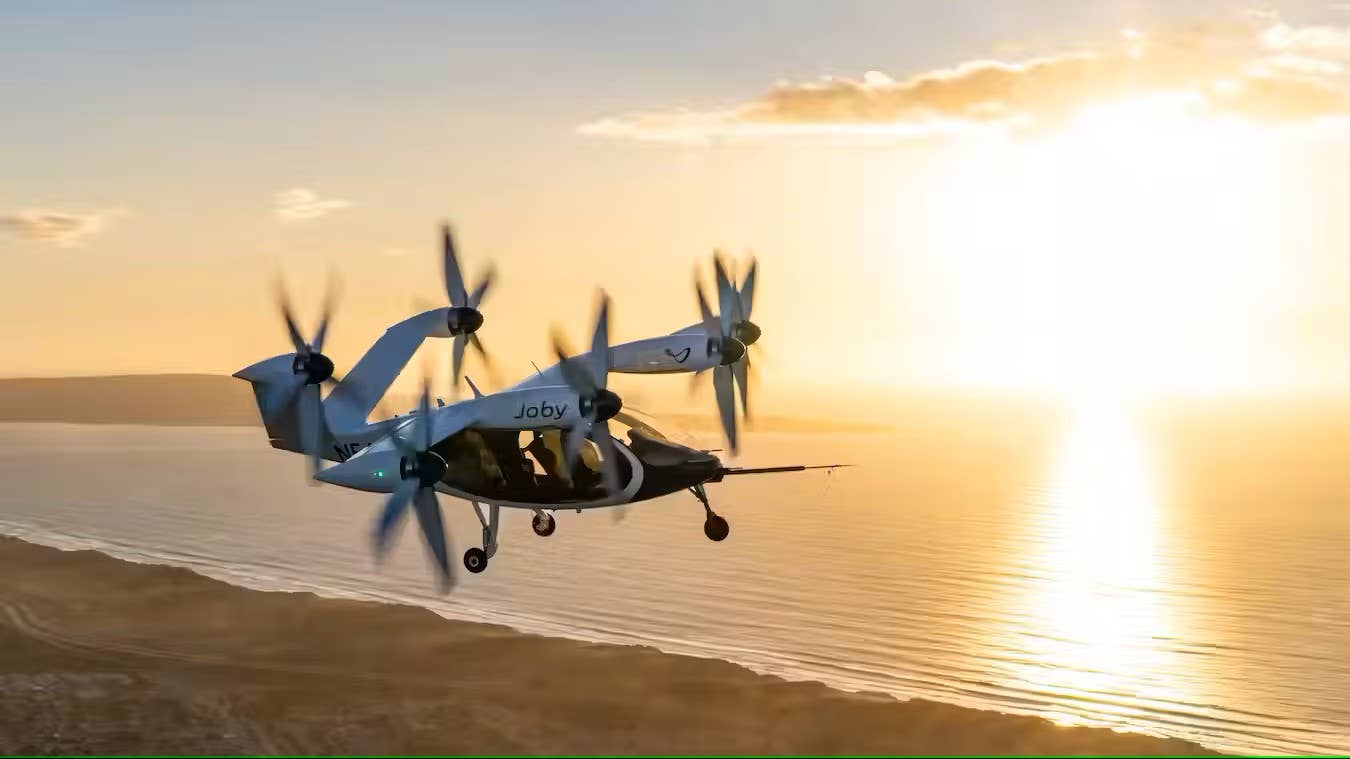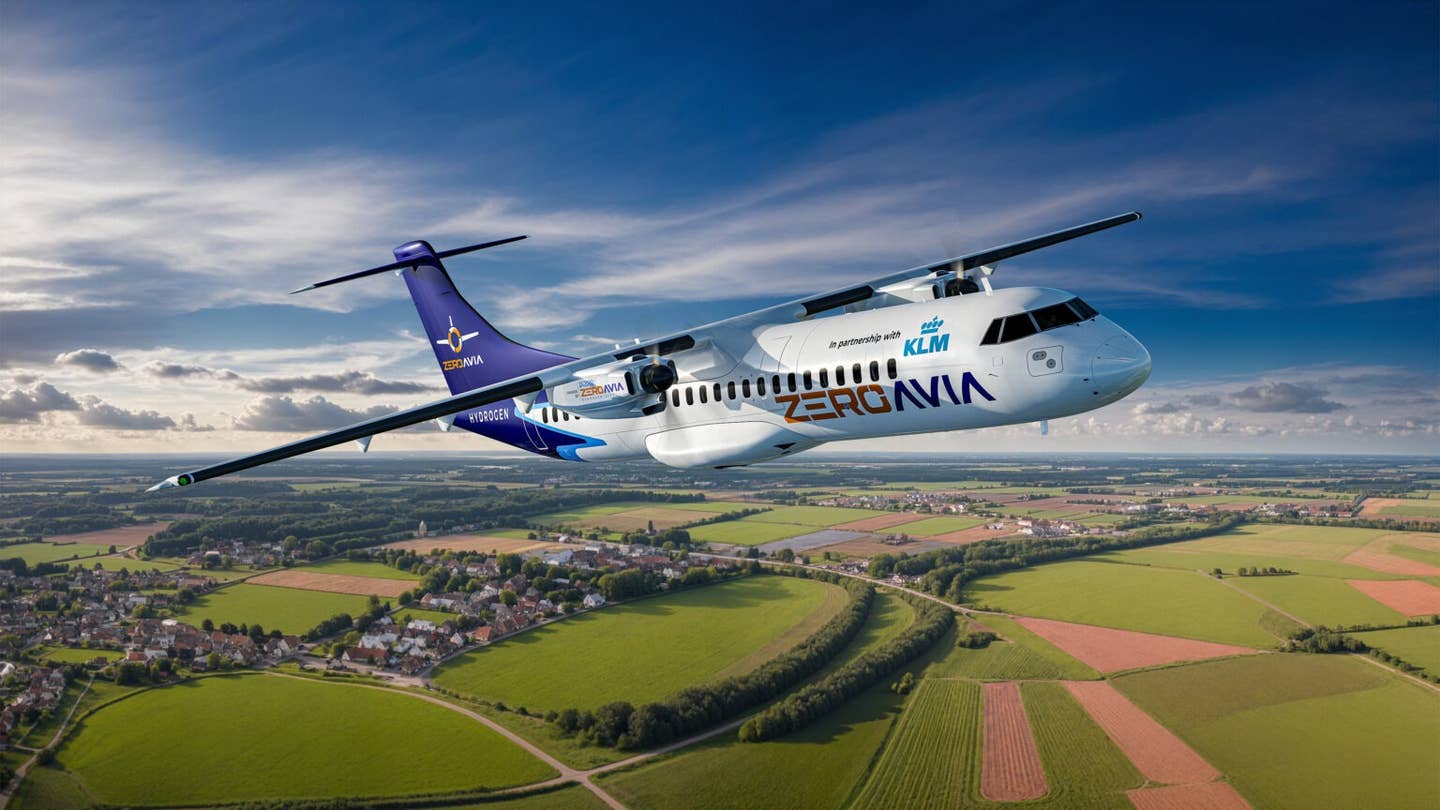Joby, Clay Lacy Aviation Bring First Electric Air Taxi Charger to Southern California
The eVTOL manufacturer said the new infrastructure will add John Wayne Airport to its SoCal network, which also includes service in Los Angeles.

Joby Aviation’s prototype air taxi flies above the company’s flight test center in Marina, California. [Courtesy: Joby Aviation]
Electric vertical takeoff and landing (eVTOL) air taxi chargers are landing in Southern California for the first time.
Air taxi manufacturer Joby Aviation on Monday signed a definitive agreement with Clay Lacy Aviation—which operates full-service FBOs at Van Nuys Airport (KVNY) in Los Angeles and John Wayne Airport (KSNA) in Orange County, California—to install the first electric charging system in the region.
The installation will be part of Clay Lacy Aviation’s planned $100 million redevelopment of the FBO terminal at John Wayne Airport, also announced Monday.
“Since our founding more than 50 years ago, Clay Lacy [Aviation] has been committed to improving lives for our community, employees, and clients, leading the industry on safety and service while taking action to reduce emissions in both our ground and air operations,” said Scott Cutshall, senior vice president of strategy and sustainability at Clay Lacy Aviation. “We’re excited to be working with Joby to install Southern California’s first air taxi charger, and we look forward to the greater convenience it will bring to the Orange County community.”
Since replacing Atlantic Aviation as a service provider at John Wayne in 2020, Clay Lacy Aviation has operated out of a temporary facility at the airport. Renovations will comprise two phases: a new terminal and a pair of 37,800-square-foot hangars will come online early this year, with two 35,000-square-foot hangars joining them in mid-2025.
The charger being added to the airfield derives from Joby’s Global Electric Aviation Charging System (GEACS), which the manufacturer released at the end of 2023. The GEACS interface is already in use at Joby’s flight test center in Marina, California, as well as Edwards Air Force Base (KEDW) outside Los Angeles. The company in September delivered its first air taxi prototype to Edwards, where it began crewed flight tests the following month.
According to Joby, GEACS is designed to support safe and efficient operations for all electric aircraft under development, including the company’s own design.
“The charging technology we have developed is optimized to support our whole industry, from air taxis delivering short range city flights to more conventional electric aircraft flying longer distances,” said JoeBen Bevirt, founder and CEO of Joby. “Joby made the specifications for the universal charging interface freely available to the wider industry in November 2023 to help accelerate the transition to clean flight. We’re therefore very pleased to see it being adopted in this key market.”
Joby’s stated goal is to make its service as accessible as possible, using a “safe and ultra-fast” system compatible with any electric aircraft. Accordingly, infrastructure developers and network operators would only need one type of charger to support the entire industry.
Joby’s charger includes multiple DC channels, which can juice up multiple isolated, redundant battery packs at the same time. A coolant system keeps the batteries at an ideal temperature during charging, eliminating the need for onboard thermal management systems.
Notably, the vehicles will communicate with the system directly. Joby will use an Ethernet connection to download flight data alongside normal charging operations, including data on battery charge level and temperature. That means operations won’t be bogged down by ground personnel.
Once complete, GEACS will be published as a freely available interface control specification. But it won’t be the only charging framework out there.
Two rival eVTOL air taxi manufacturers, Archer Aviation and Beta Technologies, partnered to push their own nationwide adoption of Beta’s air taxi chargers, making the announcement within hours of Joby’s. Archer purchased several Beta systems in a show of commitment.
The companies’ alternative pitch is for electric air taxis to adhere to the combined charging system (CCS) standard, which is used by several U.S. electric car manufacturers—with the notable exception of Tesla, the industry leader. Tesla developed its own standard, the North American charging standard (NACS).
The CCS was endorsed by the General Aviation Manufacturers Association in its Interoperability of Electric Charging Infrastructure report released last year. Both Archer and Beta contributed to the recommendation, as did Boeing’s Wisk Aero, Embraer’s Eve Air Mobility, Lilium, Volocopter, and Overair.
Archer and Beta maintain the CCS is the standard to which the top aviation OEMs are designing for. Joby, meanwhile, has claimed other electric aircraft companies will soon announce their decision to use its standard.
Unlike Joby’s system, Beta’s charger includes a separate coolant mechanism. And because the battery packs in Archer’s and Beta’s designs are in one location, the firms have no need to charge multiple packs at once. Joby’s battery packs are spread across the airframe.
Both Joby and Archer and Beta hope the industry will adopt their in-house system, which would foster some level of dependence upon their tech. For what it’s worth, in the automotive space, Tesla’s NACS—the analog to GEACS—won out, and more manufacturers, such as Ford and General Motors, are switching over from CCS.
“Today’s announcement marks a key moment on the path to delivering our air taxi service in the Greater Los Angeles area,” said Bevirt. “We’re taking concrete steps to ensure the right infrastructure is in place to support our future service and we’re grateful to be working with an industry pioneer like Clay Lacy Aviation to lead the way on bringing sustainable aviation to Southern California.”
Joby’s air taxi will fly a pilot and up to four passengers on routes spanning up to 100 sm (81 nm), cruising as fast as 200 mph (174 knots). The home-to-airport shuttle service is expected to produce zero in-flight emissions and a noise footprint “radically lower” than existing helicopters.
The installation at John Wayne adds the airfield as a node in the company’s Southern California network, Joby said. In partnership with Delta Air Lines, the manufacturer also plans to launch service in Los Angeles, as well as New York City and other airports served by Delta. Los Angeles is scheduled to be one of the company’s earliest U.S. launch markets, with commercial service expected in 2025.
Monday’s announcement follows Joby’s watershed flight in New York City in November, during which it became the first company to complete electric air taxi flights in the city. Germany’s Volocopter also participated. The demonstrations came shortly after New York City announced plans to electrify the historic Downtown Manhattan Heliport (JRB).
Like this story? We think you'll also like the Future of FLYING newsletter sent every Thursday afternoon. Sign up now.

Subscribe to Our Newsletter
Get the latest FLYING stories delivered directly to your inbox






